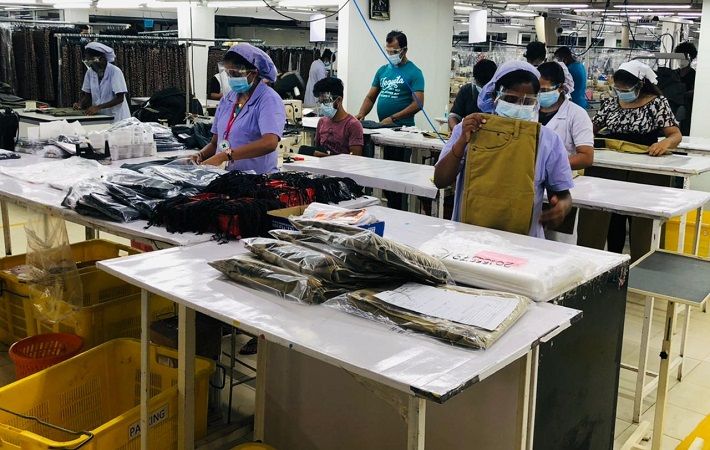
The five points are: ensure a safe working environment for employees; enhance backward integration; high-level collaboration with the authorities on retaining and improving export market access; position Sri Lanka’s apparel industry globally for the future; and develop the competitiveness of the Small and Medium Enterprise (SME) players in the sector.
“At this crucial juncture, the entire industry must collaborate if we are to effectively address challenges stemming from the pandemic and create conducive conditions for long-term growth of the sector,” JAAF secretary general Tuli Cooray said. “This Five-Point Plan is a framework which all industry stakeholders can use to collaborate in achieving our shared vision for Sri Lanka.”
Action on the plan’s first priority – worker safety – has already been initiated, with an accelerated vaccination programme. As of August, 90 per cent of the workforce has received first doses, and up to 50 per cent of workers have received their second doses. And swift progress is being made to complete vaccinating the entire workforce by the end of September 2021, JAAF said.
Further, JAAF will continue to engage with local health authorities to ensure the industry keeps its high vaccination rate up. Next, families of staff need to be vaccinated to ensure the continued safety and well-being of the communities that employees are part of. Inoculation of unvaccinated adult family members is expected to commence soon. Sri Lanka is currently projected to vaccinate everyone over 30 by the end of September as well.
As per the guidance provided by the Board of Investment (BOI) and the Ministries of Health and Labour, besides vaccination, JAAF members have put in place the required infrastructure and safety protocols to be followed strictly to restore production while minimising the risks of future outbreaks. JAAF members are also working with employee representatives to improve awareness and thereby the safety of employees and their communities.
On the second point – in enhancing backward integration, the Eravur Fabric Processing Park will be a key development. It will aid in increasing the sector’s local value addition from the current 52 to 65 per cent, a significant increase. However, the success of such initiatives would depend on the country’s ability to attract investments. JAAF said it expects to collaborate with the authorities to develop a conducive policy framework to attract investments to Sri Lanka for fabric production.
In addition, JAAF and its members will pursue other avenues to promote such investments – for example, by attending relevant international investor forums and leveraging existing partnerships to foster investment in Sri Lanka. Effective backward integration also requires raising the standard of locally-produced fabric (particularly by smaller participants in the industry) to globally accepted levels, for such inputs to be used for exports. This will also be an area of focus for JAAF.
On the third point of improving market access, JAAF will partner with the government to ensure the continuation of GSP+ by the EU. "This is particularly necessary when the industry faces significant challenges in the post-pandemic world," JAAF said. High-level collaboration by JAAF with trade authorities will focus on both retaining and enhancing export market access for apparel exporters.
JAAF will also work to ensure continued benefits for its members from the United Kingdom’s GSP scheme, for which it will engage with Sri Lanka’s Department of Commerce (DoC) and the UK Trade and Investment (UKTI) authority. JAAF will continue to seek permission for members to use fabric originating in the Association of Southeast Asian Nations (ASEAN) countries for both EU and UK GSP+, which will improve supply chain flexibility.
JAAF will also engage with the Sri Lankan government on improving market access for apparel exports through bilateral trade agreements – including with the UK and via the proposed Free Trade Agreement (FTA) with China. Similarly, the possibility of greater penetration into the Indian market will be explored.
On point four—positioning Sri Lanka as the hub for global apparel manufacturing operations, JAAF will work with local authorities to create a conducive business environment where Sri Lanka can be the headquarters for global apparel manufacturing. This would facilitate the inflow of highly skilled front-end design and development job opportunities to Sri Lanka from around the world.
In positioning Sri Lanka’s apparel sector globally for the future, especially as a premium apparel exporter, the industry will look to go beyond the success of its ‘Garments without Guilt’ initiative. Emphasis will be placed on excellence in sustainable and ethical manufacturing, aspiring to become the standard by which other countries are measured, JAAF said. Certain industry initiatives have already been launched (circularity in fashion, sustainability, and carbon neutrality). At present, Sri Lanka has the world’s first net-zero carbon apparel manufacturing facility, the world’s highest-rated LEED platinum building, South Asia’s only Passive House, and the world’s first apparel group to have all its facilities certified as a net-zero carbon emitter.
On the last point – JAAF will work towards supporting sustainable growth in Sri Lanka’s apparel sector by adopting a series of coordinated measures to strengthen the SMEs in the industry. "These initiatives will include providing assistance to improve the compliance capabilities of these players, advocating for greater government support on their behalf on aspects such as financing and export market access and engaging with the Department of Labour to improve its awareness of issues faced by the SMEs," JAAF explained.
“This (the 5-point) framework is also designed to measure progress and report back on all these fronts,” Cooray said. “It’s about walking the talk, and seen to be doing so.”
Fibre2Fashion News Desk (RKS)